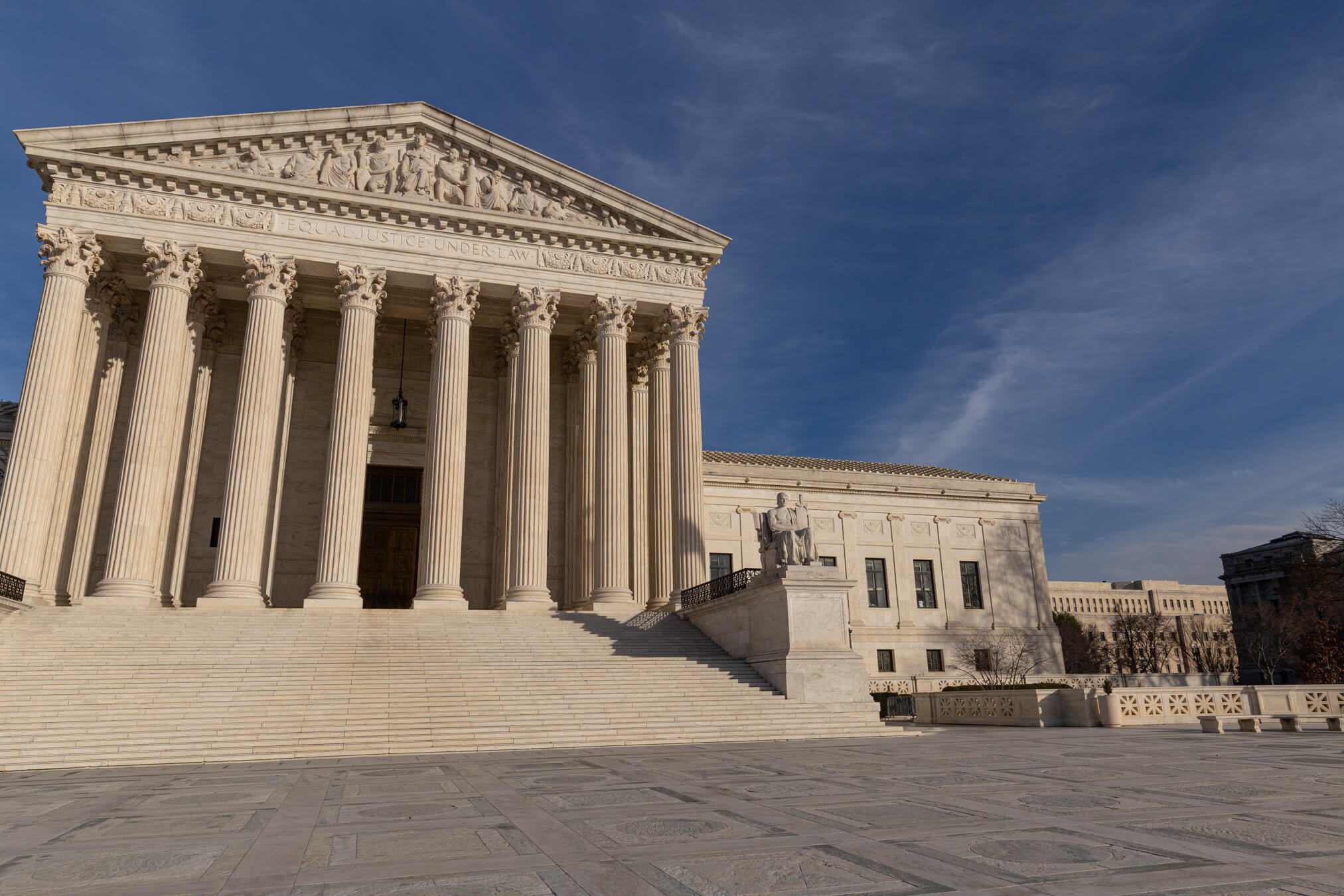Supreme Court declines to hear challenge to Arkansas state law prohibiting contractors from boycotting Israel
The court declined to hear an appeal in the case, keeping on the books an Arkansas law requiring state contractors to sign an anti-boycott pledge

The United States Supreme Court building in Washington, D.C. Photo by Matthew Litman/Forward
(JTA) – In a major victory for pro-Israel advocates, the U.S. Supreme Court declined to hear an appeal against an Arkansas state law requiring all companies that contract with the state to sign a pledge promising not to boycott Israel.
The Tuesday dismissal allows the Arkansas law to stand, ending its challenger’s effort to overturn one of many state laws that had been crafted in opposition to the Boycott, Divestment and Sanctions movement targeting Israel. Fewer than four Justices believed the case warranted a review by the Supreme Court.
The case had pitted the Arkansas Times, an independent alt-weekly publication, against the former chairman of the University of Arkansas. Under state law, all companies seeking to do business with Arkansas state entities must sign a pledge promising not to engage in any Israel boycotts. The Arkansas Times does not boycott Israel, but had refused to sign the pledge. That refusal led one of the university system’s affiliates to end an advertising agreement with the Arkansas Times, prompting the publication to sue.
Arkansas’ law is one of several nationwide that restrict business with companies that boycott Israel or refuse to sign anti-boycott pledges. These laws largely sprang up amid the growth of the BDS movement and have been criticized by progressive groups as well as by First Amendment advocates.
Federal courts have struck down similar state laws in the past, but last year, a federal appeals court ruled that Arkansas’ law is not unconstitutional because financial regulations should be considered “noncommunicative” speech. The Supreme Court did not set a new precedent by declining to hear the Arkansas case, but the move was still seen as a promising development for the so-called anti-BDS legal strategy.
Tuesday’s decision was celebrated by pro-Israel groups including the American Jewish Committee and the Brandeis Center For Human Rights Under Law, which had filed briefs on behalf of Arkansas in lower court decisions, and IAC For Action, which helped draft the Arkansas law in 2016.
“The Supreme Court has confirmed our view that state statutes opposing BDS are indeed constitutional,” AJC General Counsel Marc Stern said in a statement. “The primary aim of the BDS movement is to eliminate the State of Israel. The court’s action gives a boost to efforts to put a stop to the pernicious effort to isolate Israel economically and morally.”
Brandeis Center founder Kenneth Marcus said in a statement, “Anti-Israel boycotts will now be seen for what they are: discriminatory conduct rather than political speech.” Shawn Evenhaim, the chair of IAC For Action, said the ruling “will allow even more states to do what’s right and prevent publicly funded commercial interests from discriminating against the Jewish state.”
Alan Leveritt, publisher of the Arkansas Times, said in a statement that he was “disappointed” with the court’s decision not to take the case. “Permitting state governments to withhold state contracts from citizens who voice opinions contrary to those held by a majority of their state legislators is abhorrent and a violation of the Bill of Rights,” he wrote.
Leveritt added that his paper had “zero interest” in getting involved in Israel politics, and that it had been opposing the law on free-speech grounds. It was backed in its legal battle by the American Civil Liberties Union and progressive Jewish groups including T’ruah and J Street, as well as by the rabbi of Arkansas’ largest Jewish congregation, who said the state had not consulted with its Jewish population when it drafted the law.
Lara Friedman, president of the Foundation for Middle East Peace, criticized Jewish groups that celebrated the court’s decision not to take the case. She tweeted that AJC and others like it “are celebrating a court ruling that undermines Americans’ right to boycott ANYTHING as a matter of protest/conscience.”
Friedman recently authored a memo arguing that anti-BDS laws were being used as templates for other state laws dealing with different kinds of boycotts, including against the firearms and fossil fuel industries, as well as in state-level efforts to reduce the growing trend of environmental, social and corporate governance investing.
“This is a missed opportunity but not a ruling on the merits of the case,” tweeted documentary filmmaker Julia Bacha, whose new film “Boycott” tracks the Arkansas Times’ legal battle. “The fight to protect boycotts continue[s].”
Correction: A previous version of this article inaccurately stated that the Court had upheld the Arkansas state law and constituted a reversal of a ruling. In fact, the court’s decision not to hear the case lets the law stand, but does not set a precedent. The language of this article has been changed to reflect that.
This article originally appeared on JTA.org.














